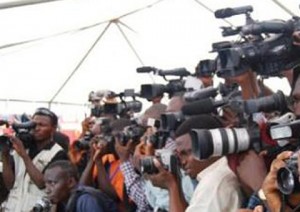Committee of Parliament bemoans state institutions’ infringement on journalists’ rights
 Alhaji Alhassan Bashir Fuseini, Ranking Member, Communications Committee of Parliament, has expressed regret about state institutions’ infringement on the fundamental human rights of Journalists in the country.
Alhaji Alhassan Bashir Fuseini, Ranking Member, Communications Committee of Parliament, has expressed regret about state institutions’ infringement on the fundamental human rights of Journalists in the country.
He said: “…no one has the right to infringe on the fundamental human rights of journalists in the country. Their right to some decency and humane treatment constitutes inhumane and degrading treatment emitted out to journalists.”
Alhaji Fuseini said this at a day’s Universal Period Review (UPR) Workshop for Members of the Parliamentary Select Committee on Communications (PSCC) in Accra.
Organised by the Human Security Research Centre, Ghana (HSRC-Ghana), with the support of the Small Media Foundation (UK), the UPR workshop, presented the process, outcome, and recommendations of the 4th UPR conducted in Ghana by the United Nation Human Rights Council Working Group, on January 24, 2023, to the PSCC, whose mandate is to oversee and examine matters relating to digital rights.
The In-person and virtual sessions provided a platform for conversation on the outcome of the periodic review undertaken by the Small Media Foundation, Coordinators of UPROAR.
The UPROAR Programme champions digital rights across Africa, the MENA region, and Central Asia through the UPR with the focus of the review being freedom of expression and internet freedom, and to share knowledge on the intersection of digital rights and human security.
Alhaji Fuseini urged state institutions to decide between attacking journalists in their line of duty very clearly adding that, “in as much as they may seem to enforce laws of the state, they nevertheless do not have the right, especially when their acts accuse journalists of transgression and in the process transgress on their rights,” he said.
Alhaji Fuseini, also a Member of Parliament (MP) for Sagnarigu (NDC), called on state institutions to define a healthy striking balance when attempting to fall.
Mr Sylvester Mensah Tetteh, Vice-Chair of the Committee, reacting to the report that Ghana’s freedom of expression had deteriorated during the review period; said he took a strong exception to it.
According to the UPROAR, privacy protection had been eroded with the adoption of the 2020 Cybersecurity Law as personal data was not legally safeguarded.
“The Criminal Offences Act and the Electronic Communications Act have been used to silence media workers,” it said.
Mr Tetteh, also an MP for Bortianor-Ngleshie -Amanfro (NPP), however, said, there was some excess, especially against media people and the Committee and colleague MPs would strive to speak against them.
“Obviously, Ghanaian Journalists will be celebrated, so, I think that the basis of this report is questionable,” he said.
The participants were also provided with insights into the Human Security impact of digital rights on Ghanaians.
In his address, Professor Abdulai B. Salifu, Executive Director, HSRC-Ghana, said the UPR was a unique process that involved a review of human rights records of all United Nations (UN) Member States including Ghana.
He said the process was state-driven and under the auspices of the Human Rights Council which offered each Member State of the Council an opportunity to declare actions they had taken to improve human rights situations in their countries and fulfilled human rights obligations.
Prof. Salifu noted that the UPR was designed to ensure equal treatment for every country in terms of the human rights situation assessment and HSRC-Ghana was yet to be an active participant in the review mechanism to establish a formal partnership with Small Media Foundation and other affiliates in the digital rights arena and global human rights in general.
“Providing the platform for today’s workshop underlines our commitment to seeking such a wider partnership and of course ensuring a wider discussion of issues relevant to good governance and an overall conducive environment or sustainable development while upholding the human rights of the people.
“We hope that through this workshop, we can engage fully and effectively to build consensus on sustainable ways to bridge the digital divide and provide digital rights in the context of human rights of our people,” he said.
Madam Cathrine Anite, Executive Director, of Small Media Foundation, said UPR could not solve all the problems alone and called for effective advocacy with policies by MPs towards the debating of laws such as freedom of expression online.
“…Let’s find a balance to control the enjoyment of internet rights, where the government will put an end to the harassment of journalists and bringing perpetrators to book,” she said.
Madam Anite further called for political will towards the implementation of laws that protected human rights.
Mr George Decardi-Nelson, Lawyer, HSRC-Ghana, called for the upholding and protection of the citizenry right, digital literacy that formed the basis of children’s rights.
The HSRC-Ghana is a non-profit, Civil Society Organisation and Human Security knowledge brokerage primarily advocating Human Security as the appropriate orientation of National Security Policy development and implementation in Africa.
HSRC-Ghana provides security policy advisory services to both state and non-state actors, on matters including the prevention of violent extremism, and the protection and empowerment of deprived and vulnerable local communities.
Source: GNA
